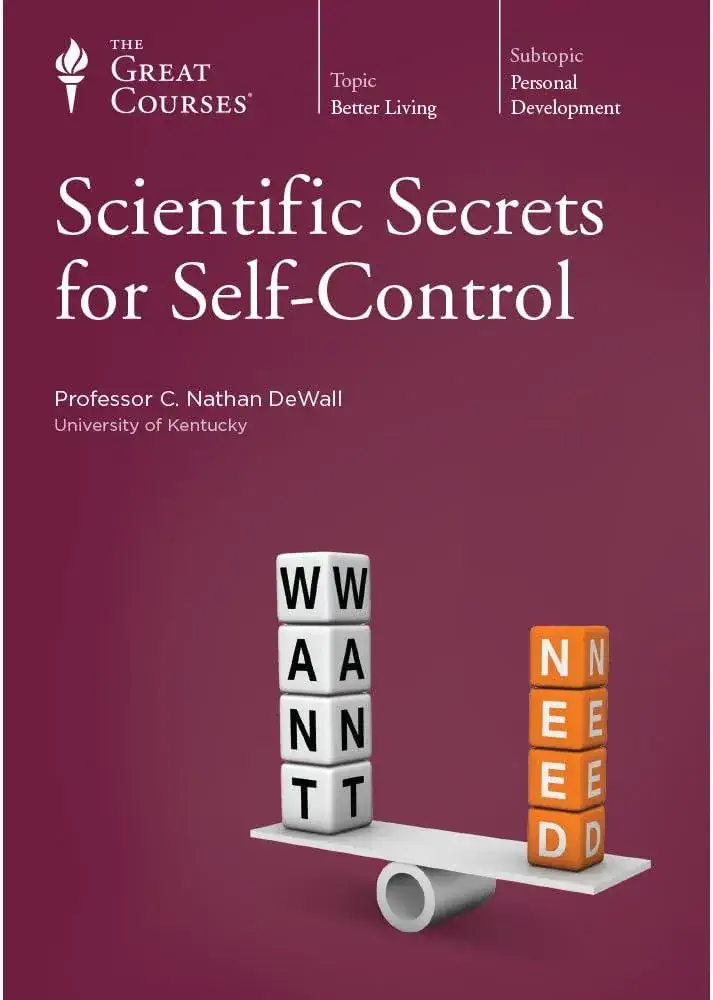Scientific Secrets for Self-Help Self-Control
I would like to review a course titled "Scientific Secrets for Self-Help Self-Control" by Nathan De Waal, PhD. Offered by Wondrium, previously known as The Great Courses, this course, despite its brevity with only six chapters, is laden with valuable insights. I found the course exceedingly effective and recommend it highly. I firmly believe that mastering self-control is essential for a fulfilling life, necessitating a focused approach to managing impulses and delaying gratification.
The course delves into various facets of self-control, sharing diverse perspectives. It highlights a striking statistic: we succumb to our impulses 50% of the time, a fact substantiated by research. Self-control is examined from three angles: a finite energy model, a skill that can be honed, and a knowledge area to be expanded. Initially perceiving self-control as a dwindling resource, I'm shifting towards viewing it as a skill or knowledge area amenable to improvement.
One study discussed associates increased resistance to temptation with mental energy depletion, echoing Sigmund Freud's concept of the mind as an energy system. Self-control is linked to the prefrontal cortex, particularly the anterior cingulate cortex, with FMRI studies showing blood flow variations correlating with self-control levels.
The course also touches on restrained eaters, highlighting the challenges they face in managing their impulses. It concludes with practical tips to enhance self-control, emphasizing the importance of metabolic energy, sufficient sleep, and regular reflection on core values, blending biological and psychological strategies.
Additionally, I admire Jahangir Khan, the squash legend, for his exemplary self-discipline and self-control, which I learned about early in life through a documentary. His ability to manage impulses and maintain rigorous self-discipline has been a source of inspiration for me.
What is an ideal trait for an individual to possess? Various studies suggest that the ability to delay gratification stands out as a key trait. This was illustrated by the well-known marshmallow test conducted on children, where they were given a choice: eat one marshmallow immediately or wait a while and receive two. The children who waited demonstrated a capacity for self-control and were able to delay gratification, earning a greater reward.
This trait is not just desirable for addressing personal issues but also for navigating relationship and societal challenges. The ability to delay gratification contributes to improved mental and physical health, relationship success, and societal contribution. Individuals who can postpone immediate gratification tend to show less aggression and are generally better members of society. This capacity is observed not only in humans but also in animals like monkeys, chimpanzees, and rats.
Longitudinal studies reinforce this concept. One study followed children from the age of 10 to 30 and found that those who could delay gratification had more favorable outcomes in health, wealth, crime rates, and overall success. Another study highlighted that self-control is a stronger predictor of academic success than intelligence, indicating its profound impact on personal achievement.
Practical tips for enhancing self-control include "delaying the day" in various aspects of life, starting with short intervals and gradually increasing them. This practice strengthens the self-control "muscle." Additionally, managing one's mental energy like an accountant—allocating high self-control tasks to times of the day when energy levels are optimal—can significantly improve productivity and well-being. For example, scheduling less demanding tasks for when one's self-control is lower and reserving mornings for activities requiring more discipline can optimize daily effectiveness. This approach is grounded in science and proves effective in harnessing the power of self-control.

